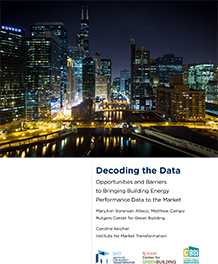In addition to allowing building owners to track and compare their buildings' performance over time and against peers, building energy benchmarking and transparency policies allow other market stakeholders and local governments to make smarter decisions and investments, reward efficiency, and drive wide-spread, continuous improvement. This white paper, which summarizes a collaborative project by Rutgers University, the Institute for Market Transformation (IMT) and the Pennsylvania State University Consortium for Building Energy Innovation (CBEI), examines both the current use of building energy performance data and the roles and perceptions of real estate stakeholders as it relates to this data. In doing so, this paper provides insight into market energy data needs, key knowledge gaps, opportunities for the use of energy data, barriers facing these opportunities, and strategies to encourage greater use of energy data in existing transactions.
This paper’s characterization of prominent stakeholder roles and perspectives provides context for the development of data presentation and communications tools that can effectively address current market barriers in order to increase the usability and relevance of energy performance data. Effectively diffusing this information into the market will bring a better understanding of the potential for energy performance data, which will in turn increase in value to all real estate stakeholders as their personal benefits are clarified. Outlined in this paper is the groundwork for strategies that will help energy benchmarking and transparency policies gain traction as they enter the market.
